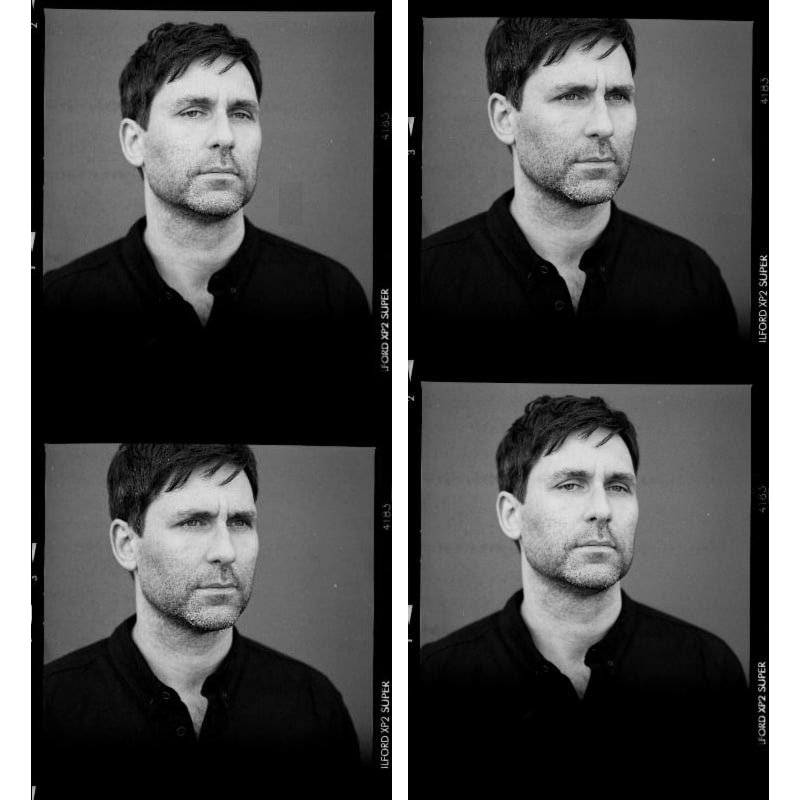 Lindsey Rome, courtesy Jamie Lidell
Lindsey Rome, courtesy Jamie Lidell
Jamie Lidell, the London musician who recently moved to Nashville, is a man of several modes. Over the course of his career, he's vacillated between electronic and old-school soul, often mixing the two together; his 2013 self-titled dance record was inspired by Janet Jackson.
After years with Warp, Lidell will release a new album, Building A Beginning, in October, via
his own imprint, Jajulin Records. The album is a celebration of the good vibes of Stevie Wonder, and Lidell's new family life in the States. Its lead single, "Walk Right Back," is a quick punch of gorgeous, '80s-inspired pop-soul.
Over the phone from Nashville, Lidell spoke to The FADER about starting fresh after departing his longtime label, how co-writing and collaborators shaped his new album, and the joy of a newborn son.
What was your thinking on refocusing your sound again on this album?
On the last two records, I was moving quite quickly, which can be great. But I didn't want to rush this one, because I'm not with Warp anymore. I made the conscious decision to leave the label one album ahead of my contract, actually, which was fine. I've known — you know, I was on Warp for 14 years. I've known them very well, so they were like, "Yeah, just go man. It's all good.
So knowing I was going to come back with this little fresh opportunity, I really explored my options as a songwriter. I've done a lot of collaborations. I got my Grammy nomination this year as a writer and producer with Lianne La Havas, and a Juno nomination with A-Trak, so you know, I've kind of started to dip my toe in the water of doing co-writing, which was a very big shift for me. It's been great, but it's also just made me realize the importance of a good song. So I was like, "If I'm going to come back with my stuff, I want these songs to be air-tight."
You worked with tons of collaborators on this album. What was it like to bring such a big group together?
This record does feature a lot of returning characters from my most prolific period, I guess. Mocky is featured a lot on the record. We did such great work back in the day — I love working with him. I managed to get Pino Palladino is on the record — he's playing on three of the tracks. We get along; he stayed at my house when he was working with Keith Urban and staying in Nashville. He just called me up, and we'd been wanting to play together for a while. One of the engineers who's involved in the record used to work with Bill Withers. I've got, like Chaka Khan's backing singers, Amy Winehouse's keyboard player, and my friend Pat Sansone from Wilco, and Daru Jones, who played drums with Jack White and is just a stupid badass drummer on every track. I did a track with Ben Ash — Two Inch Punch — you know, with the Benny Blanco connection, and this guy, Deron Johnson who used to work with Miles Davis. So I've got this sort of D'Angelo, Miles Davis, Bill Withers, Chaka Kahn, really crazy sort of skill set of these amazing people.
On my last album, it's pretty much me, you know? It's pretty much me and my brain and a lot of machines, with my keyboard player at the time. So this is a very different aesthetic. This one, I took the time to track all the drums, as well, outside of my house. Also, we went to the Sound Emporium, which is where they did the Alabama Shakes album, which is here in town. It's such a great room. It just has such a crazy sound for the drums.
There's been a renewed interest in the role of the background singer. Can you speak to that and how it affects your music?
Oh my God, it's huge. I actually learned this from Chilly Gonzales, he's one of the greatest musicians I've ever worked with. I was making Jim, we were doing like another day and Chilly was like, "You know, this is a good song, but if you had some backing vocals on this, it would just show a different intention. It would just lift everything in an incredible way." I was like, "I agree, but where am I going to find those singers?" He helped me to find singers, and they came in and nailed it.
Back in the techno days, when I was trying to get my live show together, I'd think, "What do I do that no one else does in the techno world?" I sing. I use my voice. That's what I'm all about. So working with other singers, for me, is the best thing. I love working with them, listening to them, building harmonies. That's like my first love. When I came to the same point with this record, when I've got the songs pretty solid and the backing tracks were there, I go, "OK, now I need the next-level magic," and it's going to be from the background vocals.
“It’s fucking hard to do a major chord, happy, joyful number that’s sincere without seeming super corny.”
The record is impossible to listen to without hearing Stevie Wonder's influence. Do you have any early significant memories of his music?
It is a very sort of Stevie album, in a way. Shamelessly, really, because I just kind of feel like that's the ultimate goal for me. To tap into the exuberance of that period, where there was such joy. It's very hard. You know what it is about Stevie that I love so much? It's very easy to do ballads and tap into the minor chords. It's fucking hard to do a major chord, happy, joyful number that's sincere without seeming super corny. The thing is about Stevie: he does it by just being fully committed to the idea, and just bringing the joy. Shamelessly in your face, you know? Obviously, he can go extremely deep and destroy you, but, for me, that kind of effortless joy that comes through him. His soul! It's his soul. A massive inspiration. It's not really even Stevie's voice, it's more this feeling. When you hear the mix, you feel surrounded by sound. Stevie's just the man.
You have a new son, and your wife has written for the album a bit. Is this a family album in some ways?
It really is. We're one of those couples that's super close, and we do everything together. We finish each other's sentences. I've noticed over the years that she's such a great writer. I just love to be able to collaborate with someone I love and trust. She can come up with words on a blank page, and I've never found that easy. My mind is pretty analytical. I often try to be too clever. I don't like the process of writing lyrics cold like that. For me, music comes as shapes over chords and stuff, and I work the lyrics out later.
Looking at the track list, a lot of the songs were written before [our son] Julian was around. So it's not just a happy, family album. There's a lot of melancholy, and honesty about our relationship, and doubts, and heavy shit. As soon as he burst onto the scene, obviously we've become this new unit,. When the album was being mixed and coming together, he was around. So it did become this really family album.
When you think of Stevie, you think of him sharing his life stories, you know? Sharing those moments of not being at all ashamed or weirded out at being a parent. Just wanted to celebrate it. This is a celebratory thing, a hugely celebratory moment.
One that you enjoyed, and didn't rush through.
Yeah! I like to be connected to anything that I feel allows me to be expressive. But this album is all about songs, and making them come alive. And it feels really good. It feels like I'm back, to a really good place. Being a dad, and all of that stuff; I know myself a lot more. Everything feels exactly as it should right now. I mean, I'm a satisfied man.
